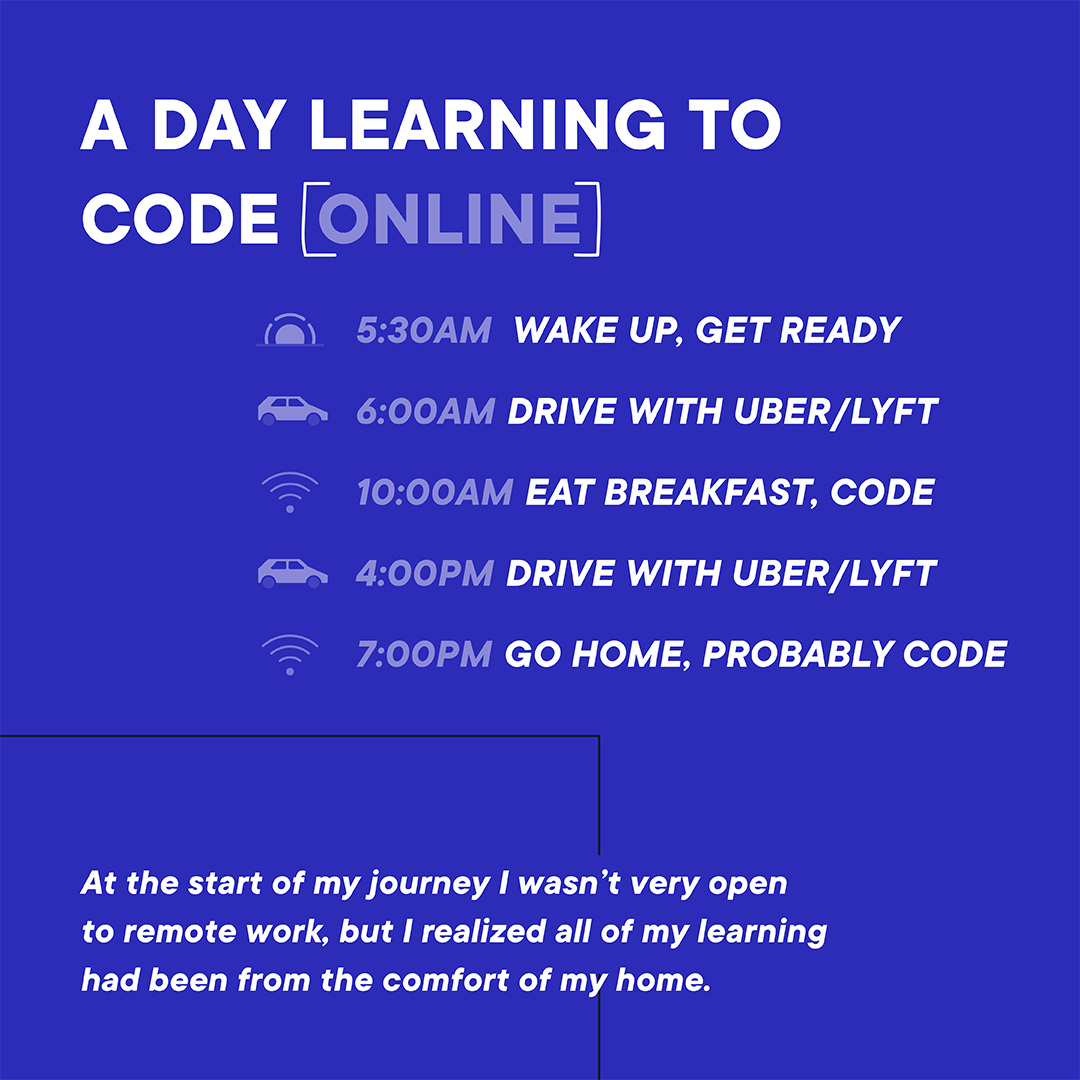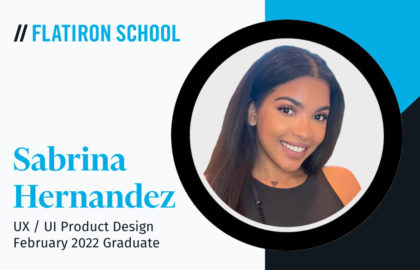
We talk a lot about a work/life balance but our online students are usually trying to balance more than just that. It’s a juggling act that includes work, family, school, and life. But we know it’s possible because we’ve seen it firsthand.
If you wanted to attend one of our programs but didn’t know how you could fit it into your life, we’re here to help. We asked some recent grads to show us their typical day at Flatiron School. Our Career Services team also had great advice to help you find balance in your life.
A day in the life of an Online Software Engineering student can be rigorous but it’s also rewarding. Here’s how our alumni found their balance.
Brenden’s schedule

Talk about a busy day! Brenden T. woke up early to start work, went home to eat breakfast and code and repeated that same routine into the evening.
He credits his productivity planner to help him find balance while he was enrolled in our Online Software Engineering program. His planner helped him keep track of his priorities and helped him establish daily goals. Those goals could be as simple as “code for 20 minutes straight.” Over time, he would extend the time he spent coding uninterrupted.
His planner also helped set him aside time for tasks around the house. Brenden says he would schedule time to do the dishes or take a break. It may seem like a given to take care of yourself but scheduling time for doing just that is important for success.
Michael’s schedule
6:00 a.m. – Wake up
6:30 a.m. – Drive daughter to parents’ house
7:00 a.m. – Arrive at parents’ house
7:30 a.m. – Arrive back at my house
7:45 a.m. – Breakfast and shower
8:30 a.m. – Code
12:00 p.m. – Lunch and watch other tutorials
5:00p.m. – Parents bring daughter home, feed daughter dinner
6:15p.m. – Eat dinner with my wife
7:00p.m. – Put daughter to bed (read lessons while she was falling asleep in my arms)
7:30p.m. – Watch TV with my wife and also continue reading lessons/doing labs
10:00p.m. – Go to bed
Michael kept a busy schedule to balance work, learning to code, and family. He alternated days coding and working when he was enrolled as a part-time Online Software Engineering student. He switched to full-time but kept the same schedule to manage his responsibilities.
“Having a schedule helped me balance being a parent and beefing up my skills,” Michael says. I couldn’t have made it this far without one!”
The busy schedule during the week freed up the weekend for Michael. He kept weekends open for friends, family, or to take a much needed break.
Alice’s schedule
-
Wake up really early
-
Look over any README lessons and save any Labs for later
-
Get ready and head to work
-
Eat dinner while working on Labs
Alice found her balance through some trial and error. “When I first started out I was very set on going through the curriculum as quickly as I could,” she says. “I would put off other social events so that I could work on more READMEs and Labs.” She realized that wasn’t the best approach and began to take more breaks.
Those breaks helped her better understand the material and gave her a chance to see friends. Alice says she was able to go through the curriculum faster than before because she understood the concepts better after a break.
Career Coach advice
Based on our alumni’s schedules, you can see the importance of taking ownership of your life. Vicki A., Senior Career Coach at Flatiron School, agrees and says ownership and communication are two keys to finding balance.
Vicki suggests three ways to do that. The first is by taking a step back, look at the bigger picture, and prioritize accordingly. You’ll be able to see what tasks or goals need to be prioritized and what could wait.
Next is identifying when you need to ask for help. When you look at the big picture, and start setting up your schedule, you’ll start to see when you’re too busy or when multiple deadlines fall on the same day.
Finally, really focus on the task at hand. It’s easy to be overwhelmed by everything. Focusing on the very next thing, instead of all the things, will make learning to code more manageable.
If you want to attend a coding bootcamp, you need to be scrappy, flexible, and adaptable (this is the single best way to make a coding bootcamp worth it for you!). Take that mindset and apply it to seeing your friends and maintaining a social life. You’re going to a coding bootcamp for a very important reason. Vicki suggests finding alternate ways to see friends. Set up a Skype call or schedule a coffee chat and add your friends to your schedule.
When you’re enrolled in one our Online Software Engineering course, Vicki reminds students that our Career Coaches are here for you. Each coach is here to help you holistically. “It’s not just about crafting a resume or prepping for an interview. “I’d suggest reaching out to your coach to help you to come up with strategies to find that balance,” Vicki says.
Lastly, don’t forget about your accomplishments and wins. Keep track of them in a journal or star them in your schedule. You’re doing something great and you should take the time to realize just how far you’ve come.
If you're interested in becoming a coder yourself, learn more about how to become a web developer and which programming languages you should learn.




